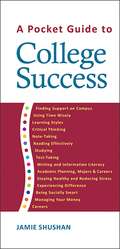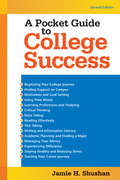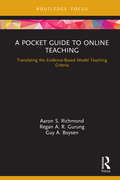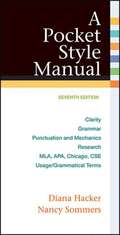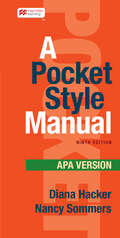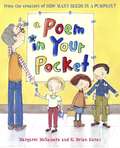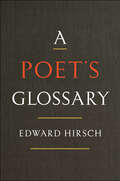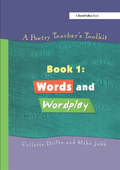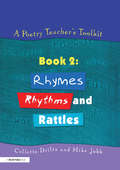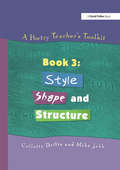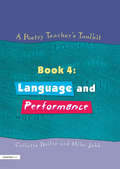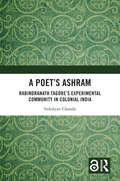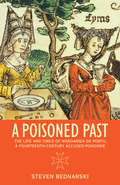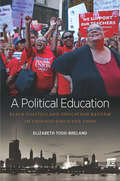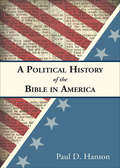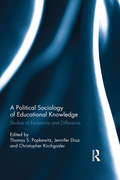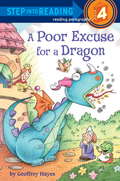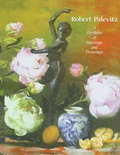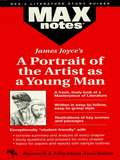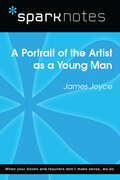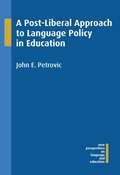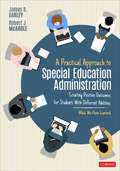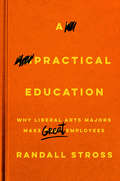- Table View
- List View
A Pocket Guide to College Success
by Jamie ShushanShort and to-the-point, A Pocket Guide to College Success, offers practical coverage on the topics typically covered in a full-size college success text, from academic skills like managing time, critical thinking, note taking, and college technology to life skills such as health, stress reduction, and money management. This new text by Jamie Shushan focuses on helping students ask the right questions of the right people so that they drive their own college success.This textbook is ideal for any orientation program or first-year experience where a full-size text provides too much content.
A Pocket Guide to College Success 2e
by Jamie H. ShushanShort and to-the-point, A Pocket Guide to College Success, offers practical coverage on the topics typically covered in a full-size college success text, from academic skills like managing your time, critical thinking, and note taking to life skills such as money management, stress reduction, and pursuing your career path. The second edition of A Pocket Guide to College Success provides additional support on the transition to college as well as features new coverage on motivation, mindset, and goal-setting to help students be successful from the start. With even more emphasis on asking questions, this text focuses on helping students ask the right questions to the right people so that they can drive their own college success.
A Pocket Guide to Online Teaching: Translating the Evidence-Based Model Teaching Criteria
by Aaron S. Richmond Regan A. Gurung Guy A. BoysenThis pithy yet thorough book provides an evidence-based guide on how to prepare for online teaching, especially for those who are making a swift transition from face-to-face to online instruction. Guided by the Model Teaching Characteristics created by The Society for the Teaching of Psychology, this book covers important topics like: how to adapt to expected and unexpected changes in teaching, how to evaluate yourself and your peers, and tips on working smarter/optimizing working practices with the resources available. The features of the book include: Practical examples exploring how to solve the typical problems of designing and instructing online courses. Interactive "Worked Examples" and "Working Smarter" callouts throughout the book which offer practical demonstrations to help teachers learn new skills. Further reading and resources to build on knowledge about online education. End of chapter checklists which summarizes suggestions about how to be a model online teacher. This essential resource will provide support for teachers of all levels and disciplines, from novice to the most experienced, during the transition to online teaching.
A Pocket Style Manual (Seventh Edition)
by Diana Hacker Nancy SommersThe thoughtfully revised seventh edition makes it even easier for students to effectively and independently address their writing and research challenges. With 325 documentation models in four styles and coverage of drafting thesis statements, writing correctly and effectively, finding and evaluating sources, and writing research papers, A Pocket Style Manual supports writers across the disciplines.
A Pocket Style Manual, APA Version
by Diana Hacker Nancy SommersAt-a-glance help for writing in APA StyleHacker/Sommers’ A Pocket Style Manual, APA Style, 9th edition offers quick, authoritative writing advice in an affordable and portable handbook. Whether you need guidance on grammar or help documenting in APA, this handbook has the answers you need.
A Poem in Your Pocket (Mr. Tiffin's Classroom Series)
by G. Brian Karas Margaret McnamaraUsher in National Poetry Month with Mr. Tiffin and his students, stars of the hugely popular How Many Seeds in a Pumpkin? and The Apple Orchard Riddle. Once again, Margaret McNamara sets her playful, child-friendly story in the classroom, and this time, poetry--from metaphors to acrostics to haiku--is the name of the game. The focus here is on Elinor, whose confidence falters as she tries to write something "perfect" for Poem in Your Pocket Day and impress a visiting poet. G. Brian Karas's accessible, adorable illustrations add to the fun.Includes a list of Mr. Tiffin's tips for celebrating Poem in Your Pocket Day.From the Hardcover edition.
A Poet's Glossary
by Edward HirschA major addition to the literature of poetry, Edward Hirsch’s sparkling new work is a compilation of forms, devices, groups, movements, isms, aesthetics, rhetorical terms, and folklore—a book that all readers, writers, teachers, and students of poetry will return to over and over. Hirsch has delved deeply into the poetic traditions of the world, returning with an inclusive, international compendium. Moving gracefully from the bards of ancient Greece to the revolutionaries of Latin America, from small formal elements to large mysteries, he provides thoughtful definitions for the most important poetic vocabulary, imbuing his work with a lifetime of scholarship and the warmth of a man devoted to his art.Knowing how a poem works is essential to unlocking its meaning. Hirsch’s entries will deepen readers’ relationships with their favorite poems and open greater levels of understanding in each new poem they encounter. Shot through with the enthusiasm, authority, and sheer delight that made How to Read a Poem so beloved, A Poet’s Glossary is a new classic.
A Poetry Teacher's Toolkit: Book 1: Words and Wordplay
by Collette Drifte Mike JubbProfessional poets spend many hours crafting a finished piece of work, yet we expect children in school to sit down and write when they are told to, whether they feel inspired or not. This series of four books is a toolkit to help you build a positive framework for children to read, write, understand and enjoy poetry - to bring a creative spark to the poetry classroom. A combination of featured poems, creative ideas, structured lesson plans and differentiated photocopiable activity sheets gives the series a uniquely flexible approach - which means you can use the materials in any classroom context. If you're wary of poetry, if you think it's boring, or if you're nervous about teaching poetry, then you've chosen the right book. Key themes covered in BOOK 1: Words and Wordplay are playing with words; making patterns with words; words and meanings; puns and puzzles; how words affect readers; moods, feelings and attitudes; and how poets manipulate words. Other books in the series are: BOOK 2: Rhymes, Rhythms and Rattles; BOOK 3: Style, Shape and Structure; and BOOK 4: Language and Performance.
A Poetry Teacher's Toolkit: Book 2: Rhymes, Rhythms and Rattles
by Collette Drifte Mike JubbProfessional poets spend many hours crafting a finished piece of work, yet we expect children in school to sit down and write when they are told to, whether they feel inspired or not. This series of four books is a toolkit to help you build a positive framework for children to read, write, understand and enjoy poetry - to bring a creative spark to the poetry classroom. A combination of featured poems, creative ideas, structured lesson plans and differentiated photocopiable activity sheets gives the series a uniquely flexible approach - which means you can use the materials in any classroom context. If you're wary of poetry, if you think it's boring, or if you're nervous about teaching poetry, then you've chosen the right book. Key themes covered in BOOK 2: Rhymes, Rhythms and Rattles are rhythm and rhyme in poetry, sounds, alliteration, words to create effects, onomatopoeia, and metaphor and simile. Other books in the series are: BOOK 1: Words and Wordplay; BOOK 3: Style, Shape and Structure; and BOOK 4: Language and Performance.
A Poetry Teacher's Toolkit: Book 3: Style, Shape and Structure
by Collette Drifte Mike JubbProfessional poets spend many hours crafting a finished piece of work, yet we expect children in school to sit down and write when they are told to, whether they feel inspired or not. This series of four books is a toolkit to help you build a positive framework for children to read, write, understand and enjoy poetry - to bring a creative spark to the poetry classroom. A combination of featured poems, creative ideas, structured lesson plans and differentiated photocopiable activity sheets gives the series a uniquely flexible approach - which means you can use the materials in any classroom context. If you're wary of poetry, if you think it's boring, or if you're nervous about teaching poetry, then you've chosen the right book. Key themes covered in BOOK 3: Style, Shape and Structure are style and structure, addressing regular and standard forms, the impact of layout, free form, 'found' poetry, and concrete poetry. Other books in the series are: BOOK 1: Words and Wordplay; BOOK 2: Rhymes, Rhythms and Rattles; and BOOK 4: Language and Performance.
A Poetry Teacher's Toolkit: Book 4: Language and Performance
by Collette Drifte Mike JubbProfessional poets spend many hours crafting a finished piece of work, yet we expect children in school to sit down and write when they are told to, whether they feel inspired or not. This series of four books is a toolkit to help you build a positive framework for children to read, write, understand and enjoy poetry - to bring a creative spark to the poetry classroom. A combination of featured poems, creative ideas, structured lesson plans and differentiated photocopiable activity sheets gives the series a uniquely flexible approach - which means you can use the materials in any classroom context. If you're wary of poetry, if you think it's boring, or if you're nervous about teaching poetry, then you've chosen the right book. Key themes covered in BOOK 4: Language and Performance are moods and feelings through the use of effective language; nonsense and humorous verse; the continuity and links between ancient and modern, between nursery and playground rhymes and Shakespeare; whatever our ability, there is a place for everyone on the poetry 'ladder'; and performance poetry. Other books in the series are: BOOK 1: Words and Wordplay; BOOK 2: Rhymes, Rhythms and Rattles; and BOOK 3: Style, Shape and Structure.
A Poet’s Ashram: Rabindranath Tagore’s Experimental Community in Colonial India
by Sukalyan ChandaThe remarkably creative life Rabindranath Tagore (1861–1941) lived has long been an area of scholarly enquiry. Yet, surprisingly, his role as the founder of an experimental ashram community remains unexplored. A Poet’s Ashram retrieves his idea of his ashram through an exploration of his writings on the institutions he built.The ashram community Tagore endeavoured to create in Santiniketan during the period 1901–1941 was his response to the question of modernity. Through his effort to reinvent the ancient Indian ideal of the ashram, he articulated his idea of a mode of collective living that was meant to be grounded in a set of ethical values derived from India’s civilizational inheritance. This book traces the history of how his ashram school evolved into a community that practised egalitarianism, inclusiveness and creativity through its daily existence. It explores a range of nineteenth- and twentieth-century discourses and Tagore’s engagement with them in order to situate that idea within its historical context, a critical juncture in the history of modern India and the world. This book’s reading of his project unravels its anti-colonial underpinnings and the commonalities it shared with some of the other similar experimental communities that challenged illiberal ideologies and power relations during the early twentieth century.Meticulously researched and perceptively written, this book will be of interest to students and researchers of history, political science, culture studies and postcolonial studies. It will also be of interest to educationists, educators and those interested in colonial modernity, modern Indian history, philosophy of education, institution building, peace, inclusivity and sustainability.
A Poisoned Past: The Life and Times of Margarida de Portu, a Fourteenth-Century Accused Poisoner
by Steven BednarskiThis is the story of Margarida de Portu, a fourteenth-century French medieval woman accused of poisoning her husband to death. As Bednarski points out, the story is important not so much for what it tells us about Margarida but for how it illuminates a past world. Through the depositions and accusations made in court, the reader learns much about medieval women, female agency, kin networks, solidarity, sex, sickness, medicine, and law. Unlike most histories, this book does not remove the author from the analysis. Rather, it lays bare the working methods of the historian. Throughout his tale, Bednarski skillfully weaves a second narrative about how historians "do" history, highlighting the rewards and pitfalls of working with primary sources. The book opens with a chapter on microhistory as a genre and explains its strengths, weaknesses, and inherent risks. Next is a narrative of Margarida's criminal trial, followed by chapters on the civil suits and appeal and Margarida's eventual fate. The book features a rough copy of a court notary, a notorial act, and a sample of a criminal inquest record in the original Latin. A timeline of Margarida's life, list of characters, and two family trees provide useful information on key people in the story. A map of late medieval Manosque is also provided.
A Political Education: Black Politics and Education Reform in Chicago since the 1960s (Justice, Power, and Politics)
by Elizabeth Todd-BrelandIn 2012, Chicago's school year began with the city's first teachers' strike in a quarter century and ended with the largest mass closure of public schools in U.S. history. On one side, a union leader and veteran black woman educator drew upon organizing strategies from black and Latinx communities to demand increased school resources. On the other side, the mayor, backed by the Obama administration, argued that only corporate-style education reform could set the struggling school system aright. The stark differences in positions resonated nationally, challenging the long-standing alliance between teachers' unions and the Democratic Party.Elizabeth Todd-Breland recovers the hidden history underlying this battle. She tells the story of black education reformers' community-based strategies to improve education beginning during the 1960s, as support for desegregation transformed into community control, experimental schooling models that pre-dated charter schools, and black teachers' challenges to a newly assertive teachers' union. This book reveals how these strategies collided with the burgeoning neoliberal educational apparatus during the late twentieth century, laying bare ruptures and enduring tensions between the politics of black achievement, urban inequality, and U.S. democracy.
A Political History of the Bible in America
by Paul D. Hanson"Biblical history, enriched by many religious and cultural traditions, flows into and is intertwined with our nation's epic, both for better and for worse. To ignore that history is to cut ourselves off from our roots and to deny the ancestral experiences that forged our individual and collective identity. " --from the prologue This substantial work explores the interplay of religion and politics throughout the history of the United States. Paul D. Hanson traces American history back to colonial times, paying close attention to the role that biblical tradition has played in shaping the national story of the United States. He then presents a detailed study of politics in the Bible that is framed by the challenges and crises in American history. Students will learn how deeply religion has influenced both domestic and international policy and contributed to the nation's sense of identity and purpose. After laying these biblical-historical foundations, Hanson considers a method of biblical interpretation that can speak to the diverse nation of today. He proposes an inclusive form of public moral discourse that invites full participation by members of all religious and philosophical groups.
A Political Sociology of Education Policy
by Helen GunterCritical education policy research has a long tradition of political sociology. Drawing on data and analysis from the Education Policy Knowledgeable Polity (EPKP) project, supported by funders such as the British Academy and the Economic and Social Research Council, this book presents a new political sociology for framing, conducting and presenting critical education policy research. In doing so, it will be the first in the field to interconnect political thinking from Arendt with sociological thinking from Bourdieu, producing innovative analysis for and about educational reform.
A Political Sociology of Educational Knowledge: Studies of Exclusions and Difference
by Thomas A. Popkewitz Jennifer Diaz Christopher KirchgaslerBringing together the sociology of knowledge, cultural studies, and post-foundational and historical approaches, this book asks what schooling does, and what are its limits and dangers. The focus is on how the systems of reason that govern schooling embody historically generated rules and standards about what is talked about, thought, and acted on; about the "nature" of children; about the practices and paradoxes of educational reform. These systems of reason are examined to consider issues of power, the political, and social exclusion. The transnational perspectives interrelate historical and ethnographic studies of the modern school to explore how curriculum is translated through social and cognitive psychologies that make up the subjects of schooling, and how educational sciences "act" to order and divide what is deemed possible to think and do. The central argument is that taken-for-granted notions of educational change and research paradoxically produce differences that simultaneously include and exclude.
A Poor Excuse for a Dragon (Step into Reading)
by Geoffrey Hayes"Punchy dialogue and compact sentences should make this a read-aloud delight."--Publishers Weekly"Part-slapstick, part-fairy tale, the gently humorous plot has enough twists and turns to keep newly independent readers engaged."--School Library JournalFred the dragon has a list of tasks he must complete in order to be a successful dragon--none of which comes naturally. But he's determined to make #5--eat people--work. Before you can say "pass the salt" he's gobbled up three people even though he doesn't have the stomach for it. Luckily a local shepherd, with the help of a giant and a witch, knows how to cure what ails him and get those pesky people out of his belly. It's happily-ever-after for everyone in ways you'd never expect.Geisel award-winning author/illustrator Geoffrey Hayes is a stepped reader maestro. The common threads between his wildly popular Uncle Tooth and Otto SIRs and the more recent Benny and Penny series (Toon Books) are clear and constant. The art is adorable, the characters are bursting with personality, and the stories are humorously subversive. From marauding pirates to misbehaving mice to a dragon who swallows people whole (and then continues to communicate with them in his belly!), Geoffrey always hits that sweet spot for the stepped reader audience--easy to decode, illustrative tales that tickle the funnybone.From the Trade Paperback edition.
A Portfolio Of Paintings And Drawings
by Robert PalevitzFirst Published in 2005. Routledge is an imprint of Taylor & Francis, an informa company.
A Portrait of the Artist as a Young Man (MAXNotes Literature Guides)
by Matthew MitchellREA's MAXnotes for James Joyce's A Portrait of the Artist as a Young Man MAXnotes offer a fresh look at masterpieces of literature, presented in a lively and interesting fashion. Written by literary experts who currently teach the subject, MAXnotes will enhance your understanding and enjoyment of the work. MAXnotes are designed to stimulate independent thought about the literary work by raising various issues and thought-provoking ideas and questions. MAXnotes cover the essentials of what one should know about each work, including an overall summary, character lists, an explanation and discussion of the plot, the work's historical context, illustrations to convey the mood of the work, and a biography of the author. Each chapter is individually summarized and analyzed, and has study questions and answers.
A Portrait of the Artist as a Young Man (SparkNotes Literature Guide Series)
by SparkNotesA Portrait of the Artist as a Young Man (SparkNotes Literature Guide) by James Joyce Making the reading experience fun! Created by Harvard students for students everywhere, SparkNotes is a new breed of study guide: smarter, better, faster. Geared to what today's students need to know, SparkNotes provides: *Chapter-by-chapter analysis *Explanations of key themes, motifs, and symbols *A review quiz and essay topicsLively and accessible, these guides are perfect for late-night studying and writing papers
A Post-Liberal Approach to Language Policy in Education
by John E. PetrovicThis provocative defense of language diversity works through the strengths and weaknesses of liberal political theory to inform language policy. The book presents the argument that policy must occupy the space between 'linguistics of community' and 'linguistics of contact' in a way that balances individual autonomy and group recognition while not reifying 'language'. Drawing on the importance of the language/identity link, the author distinguishes between language negative liberalism and language positive liberalism, arguing against the former. This distinction orients consideration of increasingly specific language policy issues, such as official languages, language rights, bilingual education, and uses of language varieties within classrooms.
A Practical Approach to Special Education Administration: Creating Positive Outcomes for Students With Different Abilities
by James B. Earley Robert J. McArdleYour guide to excelling in the complex role of a special education administrator The job of the administrator of special education is arguably one of the most difficult in a school district—and that complexity can be overwhelming. It requires an aspect of every administrative job in the district, including budgets, human resources, student advocacy, and curriculum and assessment. Written by two veteran special education administrators with more than 100 years of combined experience, this book shows current and aspiring special education administrators how to excel in the many demanding areas of their position, allowing them to be effective administrators and educational leaders. Among the many topics included in the book are The importance of visibility in the form of face-to-face interactions to assist staff, students, and building principals The importance of parents in the process The significance of confidentiality, due process, program development, and working with advocates Insight into decision-making and relationship-building A critical tool in any special education administrator′s box, as well as building administrators, central office administrators and school committee members, this book provides practical and friendly advice for a difficult but critical job.
A Practical Approach to Special Education Administration: Creating Positive Outcomes for Students With Different Abilities
by James B. Earley Robert J. McArdleYour guide to excelling in the complex role of a special education administrator The job of the administrator of special education is arguably one of the most difficult in a school district—and that complexity can be overwhelming. It requires an aspect of every administrative job in the district, including budgets, human resources, student advocacy, and curriculum and assessment. Written by two veteran special education administrators with more than 100 years of combined experience, this book shows current and aspiring special education administrators how to excel in the many demanding areas of their position, allowing them to be effective administrators and educational leaders. Among the many topics included in the book are The importance of visibility in the form of face-to-face interactions to assist staff, students, and building principals The importance of parents in the process The significance of confidentiality, due process, program development, and working with advocates Insight into decision-making and relationship-building A critical tool in any special education administrator′s box, as well as building administrators, central office administrators and school committee members, this book provides practical and friendly advice for a difficult but critical job.
A Practical Education: Why Liberal Arts Majors Make Great Employees
by Randall StrossThe liberal arts major is often lampooned: lacking in "skills," unqualified for a professional career, underemployed. But studying for the joy of learning turns out to be surprisingly practical. Unlike career-focused education, liberal education prepares graduates for anything and everything—and nervous "fuzzy major" students, their even more nervous parents, college career center professionals, and prospective employers would do well to embrace liberal arts majors. Just look to Silicon Valley, of all places, to see that liberal arts majors can succeed not in spite of, but because of, their education. A Practical Education investigates the real-world experiences of graduates with humanities majors, the majors that would seem the least employable in Silicon Valley's engineering-centric workplaces. Drawing on the experiences of Stanford University graduates and using the students' own accounts of their education, job searches, and first work experiences, Randall Stross provides heartening demonstrations of how multi-capable liberal arts graduates are. When given a first opportunity, these majors thrive in work roles that no one would have predicted. Stross also weaves the students' stories with the history of Stanford, the rise of professional schools, the longstanding contention between engineering and the liberal arts, the birth of occupational testing, and the popularity of computer science education to trace the evolution in thinking about how to prepare students for professional futures. His unique blend of present and past produces a provocative exploration of how best to utilize the undergraduate years. At a time when institutions of higher learning are increasingly called on to justify the tangible merits of the liberal arts, A Practical Education reminds readers that the most useful training for an unknowable future is the universal, time-tested preparation of a liberal education.
